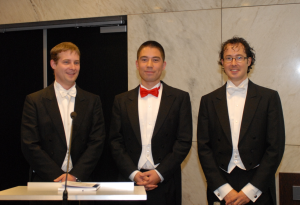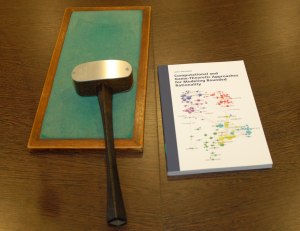PhD Thesis Defense Ludo Waltman on Computational and Game-Theoretic Approaches for Modeling Bounded Rationality
On October 13, Ludo Waltman defended his thesis entitled "Computational and Game-Theoretic Approaches for Modeling Bounded Rationality". His promoters are Prof.dr.ir. R. Dekker and Dr.dr.ir. U. Kaymak. Other members of the Doctoral Committee are Prof.dr. C.A. van Bochove, Prof.dr. M.C.W. Janssen, and Prof.dr. N.J. Vriend.
In his dissertation, Ludo Waltman introduces approaches to economic modeling that are unconventional in the way that they do not rely on the assumption that economic agents behave fully rational. Instead, economic agents are assumed to be boundedly rational which brings numerous consequences on how economic reality is modeled. For example, in models of boundedly rational behavior, dynamic elements play a much more prominent role and there is less emphasis on equilibrium behavior. In addition, in analyzing these models researchers do not only use mathematical techniques, but they also rely heavily on computer simulations. Waltman says: "My research can best be seen as part of a much larger stream of research that aims to obtain an improved understanding of the working of markets, in particular under more realistic assumptions on the behavior of market participants."
Waltman attempts to show in four studies how the behaviour of boundedly rational agents can be modeled and zooms in on markets with only a limited number of suppliers and markets in which the geographical distribution of suppliers plays an important role. In the long run, research on this topic may have important policy consequences, for instance on the way in which governments should or should not intervene in the organization of markets.
About Ludo Waltman Ludo Waltman (1982) obtained his master's degree in Informatics & Economics with honors from Erasmus University Rotterdam in 2005. In the same year, he started his PhD research at the Econometric Institute of the Erasmus School of Economics. Ludo's PhD research is in the area of agent-based computational economics. Results of his research have been presented at various international conferences and have been published in Computational Economics, Journal of Economic Dynamics and Control, and Journal of Evolutionary Economics.
Ludo Waltman (1982) obtained his master's degree in Informatics & Economics with honors from Erasmus University Rotterdam in 2005. In the same year, he started his PhD research at the Econometric Institute of the Erasmus School of Economics. Ludo's PhD research is in the area of agent-based computational economics. Results of his research have been presented at various international conferences and have been published in Computational Economics, Journal of Economic Dynamics and Control, and Journal of Evolutionary Economics.
Since 2009, Ludo has been working as a researcher at the Centre for Science and Technology Studies of Leiden University. His research interests have shifted to the field of bibliometrics and scientometrics, where he focuses on bibliometric mapping of science and bibliometric performance indicators. His research has resulted in more than fifteen publications in the main journals of the field. Together with Nees Jan van Eck, Ludo has developed a computer program for bibliometric mapping called VOSviewer (www.vosviewer.com).
Abstract
This thesis studies various computational and game-theoretic approaches to economic modeling. Unlike traditional approaches to economic modeling, the approaches studied in this thesis do not rely on the assumption that economic agents behave in a fully rational way. Instead, economic agents are assumed to be boundedly rational. Abandoning the assumption of full rationality has a number of consequences for the way in which economic reality is being modeled. Traditionally, economic models are mostly of a static nature and have a strong focus on deriving equilibria. Also, models are usually analyzed mathematically. In models of boundedly rational behavior, dynamic elements play a much more prominent role and there is less emphasis on equilibrium behavior. Also, to analyze models of boundedly rational behavior, researchers not only use mathematical techniques but they also rely heavily on computer simulations.
 This thesis presents four studies into the modeling of boundedly rational behavior of economic agents. Two studies are concerned with investigating the emergence of cooperation among boundedly rational agents. One study focuses on cooperation among firms in a Cournot oligopoly market, while the other study examines cooperation in a spatial model of price-competing firms. The other two studies in this thesis are concerned with methodological issues in the use of evolutionary algorithms for economic modeling purposes. One study shows how evolutionary algorithms can be analyzed mathematically rather than using computer simulations. The other study criticizes the use of a so-called binary encoding in evolutionary algorithms.
This thesis presents four studies into the modeling of boundedly rational behavior of economic agents. Two studies are concerned with investigating the emergence of cooperation among boundedly rational agents. One study focuses on cooperation among firms in a Cournot oligopoly market, while the other study examines cooperation in a spatial model of price-competing firms. The other two studies in this thesis are concerned with methodological issues in the use of evolutionary algorithms for economic modeling purposes. One study shows how evolutionary algorithms can be analyzed mathematically rather than using computer simulations. The other study criticizes the use of a so-called binary encoding in evolutionary algorithms.
More information
Pictures of the defense
Full text of the dissertation

